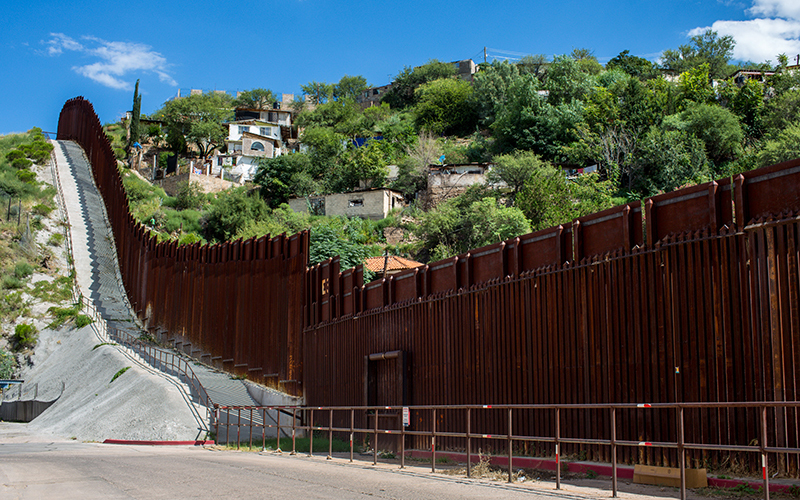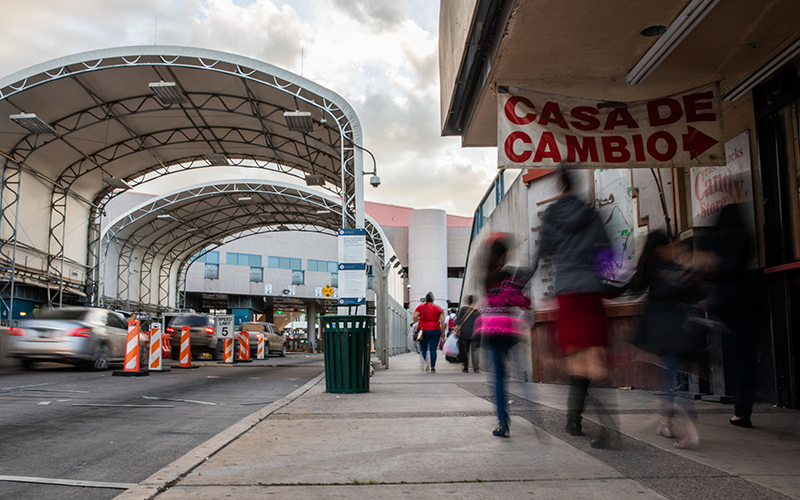
A steel fence built years ago defines the U.S.-Mexico border between Nogales, Arizona, and Nogales, Sonora. (Photo by Nicole Neri/Cronkite News)
PHOENIX – President Donald Trump has threatened to declare a national emergency to get a wall built on the southern U.S.-Mexico border. But experts believe there are obstacles to using that power.
Cronkite News reached out to Liza Goitein, a co-director of the Liberty and National Security Program at the Brennan Center for Justice in Washington, D.C., and William Banks, a professor emeritus of law and the founding director of the Institute for National Security and Counterterrorism at Syracuse University. Both also appeared at a Jan. 16 panel discussion hosted by the Brennan Center about presidential emergency powers.
No. 1: Only Congress can fund construction projects
Trump has repeatedly demanded that Congress approve funding for increased border security, including a physical wall, but Goitein said that’s all he can do even if he declares a national emergency.
A president would have “broad power” under numerous statutes in the case of a national emergency, Goitein said, but none expressly gives the president a legal route to building a border wall without approval from Congress, which holds the power of the purse.
“The president cannot spend funds on anything Congress has not appropriated funds for,” Goitein said. “He can use emergency powers for a lot of reasons, but that’s not one of them.”
If the president were to declare a national emergency with the sole purpose of unlocking funds to divert for a wall, Goitein said it would be unconstitutional and there would be pushback in the courts.
“There’s no path of least resistance,” Goitein said.
In an email on Jan. 28, the White House said “nothing is off the table, but we still believe the best path forward is working with Congress on a solution to the humanitarian and security crisis at the southern border.”
No. 2: A true emergency would have needed immediate action
Although Goitein said it isn’t a legal requirement, “in a true emergency, the president would declare the emergency immediately … because Congress doesn’t have time to act.”
However, security at the border with Mexico has troubled administrations as far back as 1915, when Congress “authorized a separate group of mounted guards” to patrol the border, mainly to keep out Chinese immigrants trying to skirt the Chinese Exclusion Act of 1882. The agency that became Customs and Border Patrol was not created until 1924.
In this context, Goitein says the border problem is neither immediate nor has Congress not had time to act.
The president is “trying to get around Congress,” Goitein said. “No amount of discretion gives the president the power to undermine the Constitution.”

People walk near one of the three ports of entry in Nogales. (Photo by Celisse Jones/Cronkite News)
No. 3: Troops can only construct something for military purposes
Trump also has deployed active-duty troops to the border twice since late October, and part of their duties has been to fortify existing barriers. However, Banks said there are too many limitations for him to simply order a wall built by the military without congressional approval or appropriated funds.
“Military-construction authorities allow him to reallocate some authorized funds … but only for a military purpose,” Banks said. The president can only use Pentagon funds and can’t divert money from other U.S. appropriations, he said.
If the president were to unlock these military dollars by declaring a national emergency, Banks said “it might work.” He described how the Army Corps of Engineers would be the agency designing and building the wall, but the president has to persuade the courts in any legal challenge that the construction is for a military installation, which Banks called “a bit of a reach.”
“(The border) is a civilian operation,” Banks said. “We don’t mix law enforcement and the military here in the U.S.”
Senate Democrats introduced legislation Monday to block the president from using those same military funds “for the construction of barriers, land acquisition, or any other associated activities on the southern border without specific statutory authorization from Congress.”
No. 4: The president can’t demand state resources in a national emergency
In the past, Trump has asked border-state governors, including Arizona’s Doug Ducey, to deploy the National Guard to help the Border Patrol with support activities. Even in a national emergency, Banks said, those governors still can decline such a request.
The president can’t “commandeer state resources” to serve the interest of the federal government, Banks said.
“That’s the governor’s call,” he said. “It (an emergency declaration) doesn’t federalize them.”
Under the circumstances of a national emergency, only the Insurrection Act can authorize a president to deploy the military, National Guard or “militia of any state” to intervene, but only to cease “unlawful obstructions, combinations, or assemblages, or rebellion against the authority of the United States.”
Connect with us on Facebook.